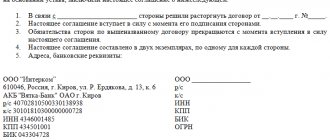Commercial rental agreement for residential premises: procedure for filling out, sample for downloading
As follows from Article 671 of the Civil Code of the Russian Federation, a commercial rental agreement for residential premises is an agreement under which one party transfers living space to the other for use for its intended purpose. In these legal relations, rights and obligations are distributed between the landlord and the tenant. According to Article 91.16 of the Civil Code of the Russian Federation, only part of a commercial rental house (room, block, etc.) can be an object.
A legal entity can also be a party to the agreement (tenant). However, the accepted facility can only be used to accommodate company employees. The rooms, as a rule, are completely ready for guests to move in: equipped with furniture and household appliances.
The contract must include the following details:
- Location of the object (city, street, house, number);
- Type of area (apartment, room, block);
- List of property to be leased (furniture, household appliances, interior items, plumbing fixtures);
- The tenant's liability for damage to the landlord's property;
- Payment for the use of the area, the procedure for its payment, increase and revision (it is necessary to indicate the amount in rubles or in foreign currency at the Central Bank exchange rate, the day of transfer);
- The procedure for paying for utilities and telecommunications (telephone, Internet, etc.);
- Advance or amount of collateral acting as security for the obligations of the tenant;
- Duration of the agreement (in the absence of this clause, it is considered concluded for 5 years);
- Additional conditions (for example, the tenant may be required to carry out cleaning, maintain electrical appliances, carry out routine repairs, etc.).
We recommend commercial rental agreements for residential premises and make sure that they comply with the agreement being concluded. It should be noted that residential premises are subject to intended use only: it cannot be turned into an office, showroom, or store. If one of the parties violates the terms of the agreement, the second party to the legal relationship has the right to terminate the transaction and demand compensation for losses (if any).
If the premises used for rental have changed ownership, this does not entail automatic termination of the contractual relationship. The new owner is obliged to comply with the terms of agreements concluded previously.
Sample of a standard commercial rental agreement
First of all, it should be understood that any rental agreement must meet a number of requirements and points specified in the Civil Code. It is this document that regulates all legal relations between parties to transactions regarding the issue of renting, hiring or buying and selling housing.
For example, Article 673 of the Civil Code of the Russian Federation specifies the following requirements for a real estate property being rented out:
- Isolation of the room. Residential premises rented out under a lease agreement must be fenced off by building structures (walls) from other residential premises. Also, such a room must have its own separate entrance or exit to the street. Based on this, we can conclude that, according to this agreement, it will not be possible to rent out one room in an apartment or house;
- Housing must comply with all standards provided by law. All norms are prescribed in the Housing Code;
- The object to be handed over must be complete. This is rather a clarification of the first requirement regarding the isolation of the room. You can rent out an apartment, a house or part of a house, but one way or another the object must be rented out completely and be intact.
The legislation of the Russian Federation does not provide for a strict form for concluding this agreement. There are a number of mandatory conditions that must be specified in the contract.
Otherwise, the transaction is concluded solely by agreement of the two parties, on the terms agreed upon by them. The main thing is that these conditions do not contradict current legislation.
Let's consider the structure of a commercial residential lease agreement:
- Preamble. It indicates the name of the agreement, the date and place of conclusion, as well as information about the participants. Here it is important to clearly describe who is the landlord and who is the tenant of the residential premises;
- Description of the subject of the contract. That is, a description of the residential premises, which, under the terms of the contract, is transferred for use to the tenant for a certain period. It is advisable to make this description as detailed and complete as possible;
- Price. The amount that the tenant must regularly pay to the owner for the use of the property is clearly stated. The price must be a specific value, otherwise the contract can be considered not concluded;
- Composition of residents who will live in the rented living space. At a minimum, it is necessary to include everyone’s full name, but it is better to provide full passport information;
- List of property that is rented along with housing. It is necessary to describe all valuable property and indicate its condition at the time of delivery;
- Duties and responsibilities of the parties;
- Additional terms;
- Details and signatures of all participants in the transaction.
Article 683 of the Civil Code of the Russian Federation. Term in the residential lease agreement (current version)
1. The maximum term for concluding a rental agreement is five years. We believe that this period was established due to the fact that the residential premises are used only for living, therefore there may be a need to provide the citizen with the opportunity to live in the residential premises for a long time.
The lease agreement, in turn, may establish a different period, but not more than five years. Also, the lease agreement may not specify a period at all, but in this case it will be considered a contract concluded for a period of five years. It follows that the term in the lease agreement is not its essential condition.
From the materials of judicial practice it follows that it is the term that is the criterion for distinguishing between commercial rental agreements and social rental agreements (see Determination of the Armed Forces of the Russian Federation dated October 23, 2012 N 18-КГ12-59).
If a social rental agreement is concluded, in accordance with Art. 60 of the RF Housing Code, such an agreement is concluded without specifying its validity period.
Depending on the term, rental contracts are divided into:
— short-term — contracts concluded for a period of up to one year;
- long-term - contracts concluded for a period of one to five years.
For short-term contracts, since these are contracts valid for a short period, provisions indicating in them citizens permanently residing in residential premises with the tenant, temporary residents, the tenant's preemptive right to conclude an agreement for a new term, sub-tenancy, replacement of the tenant, do not apply .
2. Applicable law:
- Residential Complex of the Russian Federation.
3. Judicial practice:
— Determination of the Armed Forces of the Russian Federation dated October 23, 2012 N 18-KG12-59;
— Determination of the Investigative Committee for civil cases of the Krasnoyarsk Regional Court dated October 2, 2013 in case No. 33-9455/2013;
— Determination of the Investigative Committee for civil cases of the Rostov Regional Court dated May 28, 2012 in case No. 33-5818;
— Determination of the Moscow City Court dated July 18, 2014 N 33-23105;
— Determination of the Investigative Committee for civil cases of the Leningrad Regional Court dated May 22, 2014 in case No. 33-2472/2014;
— Determination of the Investigative Committee for civil cases of the Tomsk Regional Court dated 04/08/2014 in case No. 33-960/2014;
— Determination of the Investigative Committee for civil cases of the Smolensk Regional Court dated 04/01/2014 in case No. 33-1154;
— Determination of the Investigative Committee for civil cases of the Tver Regional Court dated 03/06/2014 in case No. 33-806;
— Determination of the Investigative Committee for civil cases of the St. Petersburg City Court dated March 3, 2014 in case No. 33-2695/2014;
— Determination of the Investigative Committee for civil cases of the St. Petersburg City Court dated March 3, 2014 in case No. 33-2638;
— Determination of the Investigative Committee for civil cases of the St. Petersburg City Court dated March 3, 2014 in case No. 33-2637;
— Determination of the Investigative Committee for civil cases of the St. Petersburg City Court dated 02/04/2014 in case No. 33-1961/2014;
— Determination of the Investigative Committee for civil cases of the Khabarovsk Regional Court dated September 27, 2013 in case No. 33-6148/2013;
— Determination of the Investigative Committee for civil cases of the St. Petersburg City Court dated 08/06/2013 in case No. 33-10667/2013;
— Determination of the Investigative Committee for civil cases of the Pskov Regional Court dated June 25, 2013 in case No. 33-1057/2013.
List of essential terms of the lease agreement
And even when choosing a payment method, partners can proceed from their own interests. In most cases, payment is made in cash or by bank transfer. However, there are other forms of payment, which are also spelled out in detail in the lease agreement as one of the essential terms of the agreement:
- For the entire object (a room, an entire building, a production workshop, a car with or without a crew, etc.) - this is the most common, simple case.
- Per unit of total area – i.e. per square meter or other units. In this case, the actual differences between different premises (heated, unheated, industrial, commercial, warehouse, etc.) are not taken into account.
- Per unit area of individual premises, i.e. just taking into account the different prices of different real estate objects (the amount is usually broken down into components and then summed up).
We recommend reading: Maternity capital in 2020, what can be used for after 3 years
Features of drawing up a contract
The document is drawn up in writing, taking into account the requirements and recommendations of the civil legislative framework. Particular attention is paid to content. The contract must include the following information:
- name, date and place of drawing up the document;
- information about the parties to the transaction. Personal data and passport details will be required;
- the subject of the transaction is residential real estate and its main characteristics. You must indicate the exact address of the apartment (house), number of rooms and area;
- confirmation of the fact that the residential premises belong to the landlord. The owner is obliged to confirm ownership of the living space;
- data regarding the cost of the contract. If the owner of the home is a private person, he has the right to independently set the price. You also need to indicate who will pay for utilities. If this information is not included in the agreement, the employer is appointed responsible for timely payment of utilities;
- validity. The maximum period of validity of a commercial tenancy agreement is 5 years. If the initial text of the agreement does not include data regarding the time period, the law establishes the maximum possible time;
- conditions for termination of the transaction. The circumstances under which the document may be canceled or terminated are indicated.
The employer has priority for termination. He can move out without specifying a reason, after notifying the owner in advance. As for the lessor, he will need more compelling reasons for termination.
Document form
An agreement to use a residential property on a paid basis must be drawn up strictly in writing. This requirement is specified in the provisions of Article 674 of the Civil Code of the Russian Federation. The legislator does not provide for exceptional situations.
An important nuance. If the document is valid for more than 12 months, it must be registered. Otherwise, the parties to the agreement will be liable under Art. 19.21 Code of Administrative Offenses of the Russian Federation.
Subject of hire
The subject of the transaction is residential premises. It must comply with all the characteristics outlined in clause 1 of Article 673 of the Civil Code of the Russian Federation:
- Isolation. Free entry of unauthorized persons into the rented area is prohibited.
- Suitability for habitation. The living space is connected to all communications, and the current condition of the home should not pose potential dangers to the tenant.
- The premises are the property of the lessor. The object of the contract is only those premises that belong to the lessor. According to the current norms of civil law, it is impossible to rent out someone else’s housing for a fee.
The legislator stipulates that residential premises are equipped and arranged in such a way as to eliminate possible dangerous situations for residents.
Duties of the parties
A commercial lease agreement is a bilateral transaction and is concluded between:
- landlord, that is, a person who has proprietary rights to the living space. An authorized representative of the owner of the home may act as a landlord, subject to the existing delegated powers confirmed by a notarized power of attorney;
- a tenant, whose role is a citizen who purchases a residential property for use for a period of time for a certain fee.
The requirements of the legislative framework establish a number of rights and obligations of participants in the contractual process. If they are not observed, the violator faces penalties.
The responsibilities of the landlord include the following:
- Transfer to the tenant of a residential property that meets the requirements of regulatory documentation.
- Carrying out proper use of the building where the subject of the transaction is located.
- Provision of utility services on a paid basis.
- Carrying out repair operations as necessary.
At the same time, the owner of the residential premises receives a number of specific rights:
- Refusal to move other persons in with the employer. The exception is children under 18 years of age. Consent will not be required for them.
- Refurbishment of premises. If this procedure can significantly change the operating conditions of the housing, you will need to first obtain consent from the tenant.
- A categorical ban on moving in temporary residents if this contradicts the current standards for living space per person.
In addition, the owner has every right to demand that the user pay utility bills on time, and at any time can monitor the fulfillment of his demand.
In turn, the employer acquires the following rights and obligations:
- use of premises within the framework of the current agreement;
- ensuring the safety of property, maintaining the proper condition of the home;
- carrying out repair work. If repairs are required due to defects caused by the owner, the tenant may demand compensation;
- timely payment of utilities and settlement with the owner of the property according to the terms of the agreement;
- immediate vacancy of the residential property in the event of termination of the contract;
- use of the premises for personal residence and family members;
- carrying out re-equipment or reconstruction of housing in agreement with the owner;
- prohibition on subletting part of the apartment to third parties. This will also require coordination of the issue with the owner.
Documents for download (free)
- Commercial lease agreement (form)
Determination of cost
If the owner of the home is a private person, he has the right to independently set the rental rate. Legal entities that own residential premises act in accordance with internal rules, or set the cost of hiring at the average rate in the region (locality).
Duration and termination of the contract
A residential rental agreement on a commercial basis is concluded for a maximum of 5 years.
If the text of the agreement does not contain information regarding the duration of the lease relationship, it is considered that it is drawn up for a 5-year period. Upon expiration of the term, the tenant has the preemptive right to prolong the transaction or enter into new agreements.
The law establishes the obligation of the owner to offer the tenant to renew the contract at least 3 months before the end of the term. It is also possible to terminate the relationship if the owner intends to stop renting out housing altogether in the foreseeable future.
The contractual relationship is terminated:
- upon expiration of the agreement;
- at the request of one of the parties in court;
- unilateral decision of the employer.
Essential terms of a commercial rental agreement for residential premises
Payment for renting premises is one of the most important terms of the contract. The contract specifies not only the amount, but also the terms of payment, its procedure and other conditions. In some cases, a fee is specified per unit of area; in this case, the full amount of payment is established based on the area of the rented premises. However, the fee is not a constant value; it can be reduced if living conditions deteriorate, naturally, not through the fault of the tenant.
The conclusion of an agreement has a single purpose, which is expressed in the provision of property for temporary use. A significant difference is that a rental agreement can only be concluded with a legal entity. A similar agreement concluded with a legal entity can only be a lease agreement for premises by T.M. Panchenko. Use of other people's property / T.M. Panchenko. - M.: “Publishing house “Tax Bulletin”, 2020. - 320 p..
We recommend reading: Paying Property Tax in 2020 in Kaliningrad






